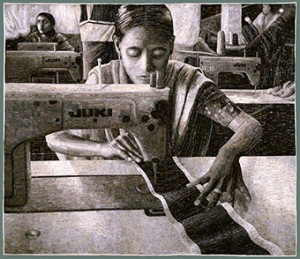I’ve started reading William Cavanaugh’s Being Consumed: Economics and Christian Desire. I’m only half-way in, but I’m pretty sure this is one of those books that anyone who pastors a church in the U.S. really should read, wrestle with, and then figure out how to communicate its message to their congregants–or at least start a conversation about it. I plan to write a series of four posts on this book, corresponding to the four chapters of the book.
Freedom and Unfreedom
Cavanaugh argues that our (western/American, etc.) problem is not that we are greedy materialists who need to possess lots of things. Instead, our problem is that we are restless consumers, driven by a constant, unsettled desire for the next and for the new. We are shoppers, shopaholics, even. Corporations know this, of course, and they cultivate and stimulate those desires with great savvy. Further, they know they must provide products at an affordable (enough) cost to enable us to keep up our insatiable lust for shopping–for the new and the next. This means that corporations also shop for the cheapest labor to make the products they will then sell to the American consumer, who is looking for the best deal.
This is where Rosa Martinez comes in.

Cavanaugh quotes an advertisement in a textile journal paid for by the U.S. Agency for InternationalDevelopment, which states, “Rosa Martinez produces apparel for US markets on her sewing machine in El Salvador. You can hire her for 33 cents an hour.”
At its core, free market capitalism is a system based on a supposed unbridled freedom for persons to enter into non-coerced arrangements which will mutually benefit each partner. So a major apparel company (i.e., the Gap or Old Navy) might contract with Rosa for her services (or contract with hundreds or thousands of Rosas, gathered into factories), and Rosa likewise agrees to work for said amount. Her pay won’t be nearly adequate for a secure life but it’s better than starving to death. Though as Cavanaugh points out, some of them actually work themselves to death. In any case, Rosa freely enters into the arrangement. Right? Or does she?
Cavanaugh suggests we need to re-think our notion of freedom and that we need to do that theologically. He offers St. Augustine as a guide. For Augustine, freedom should not be defined negatively (simply as the absence of any coercion or constraint). Human beings are always constrained or impelled by something–we are always driven by something not entirely under our ‘control.’ So freedom needs to be understood, instead, in light of the goal, or the telos–that toward which we are compelled or that by which we are impelled. When an alcoholic freely chooses to drink, is the choice really free? When Rosie freely chooses to work for less than a living-wage, is that a free choice?
Is Rosie free? At one level, she seems to be. She offers her services for a contracted amount. She willingly enters into the arrangement. But not so fast, Cavanaugh says. This view of freedom “pretends to be blind to the real disparity of power at work here while simultaneously stripping away the ability to judge an exchange on the basis of anything but sheer power, since any telos, or common standard of good has been eliminated from view” (24).
When we think about economic arrangements, and the best way to organize those relationships, we should not only ask whether there is a absence of direct coercion, but whether the arrangement reflects and aims toward a higher goal: the human flourishing of all parties involved in the ‘agreement’; put another way, the “common good.”
It’s important to note that Cavanaugh is not critical of free market capitalism as such. He’s simply saying that we need to think harder about what is actually taking place within the system. How is it working itself out “on the ground”? What do we mean by “freedom”? Who is really free–and for whom is “freedom” a false, empty construct or simply an abstract idea that has no purchasing power (so to speak) in real life?
Is Rosie Martinez really free (in the Augustinian, positive, sense of freedom)? If she isn’t, should we continue to buy clothes–or coffee, or computers, or whatever, made by the Rosies of the world, if our consumerism simply perpetuates a system that is not nearly as free as we thought it was? If we don’t continue to consume, will Rosie have no work (and no paycheck, and no food) at all?
Free market capitalism, for better or worse, isn’t going away. And frankly, it’s hard for many of us to imagine a better overall economic system. But are you and I free to reject, protest, or at the very least acknowledge its unfree instantiations–and to support those who are pushing for a little more justice within the system?











